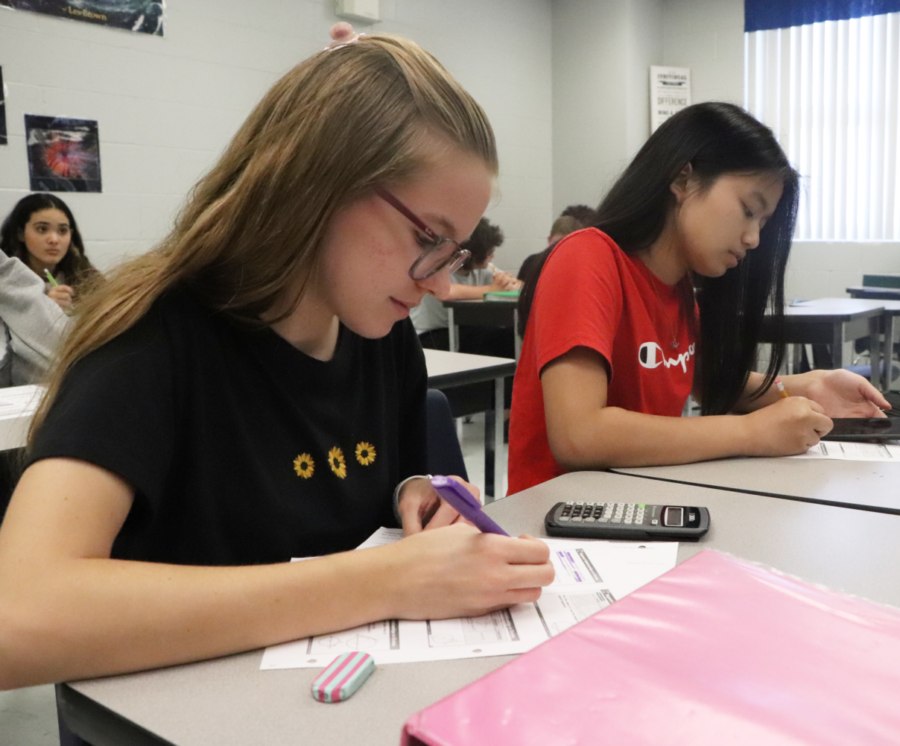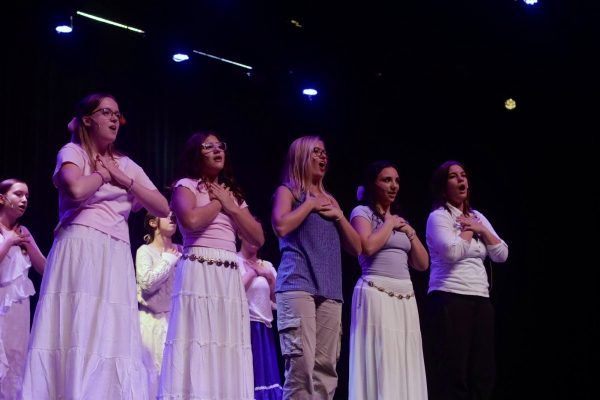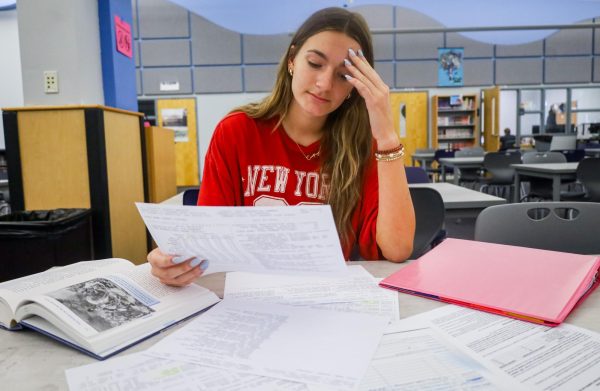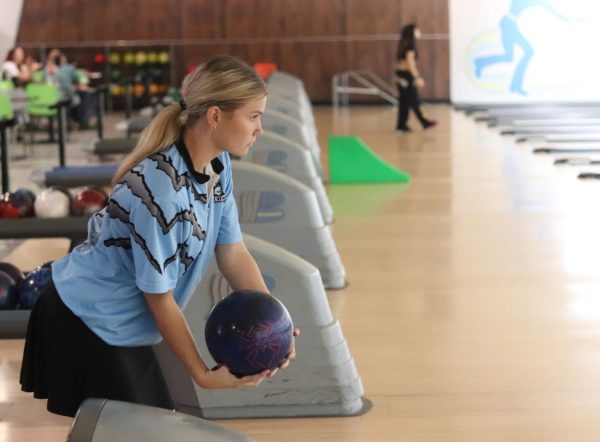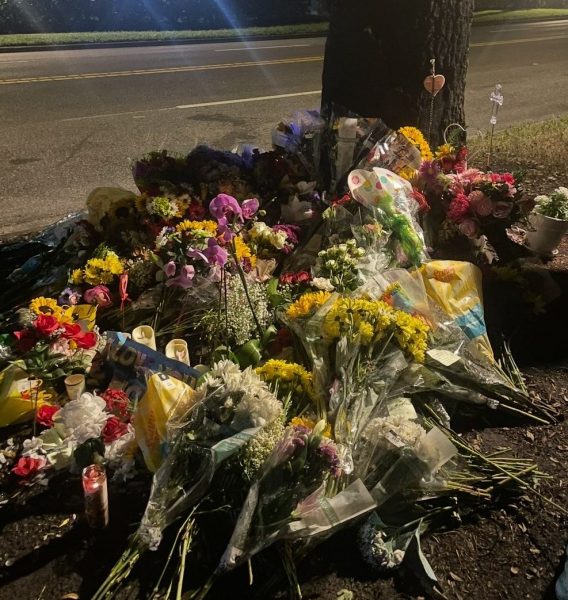Florida DOE rejects 41% of math textbooks
photo by Skyler Glenn
Freshmen Annabelle Etz (left) and Josephine Lim (right) take notes in Geometry Honors. Two Geometry textbooks were rejected due to the discussion of banned topics.
Just weeks after Gov. Ron DeSantis signed the Stop WOKE Act and “Don’t Say Gay” bills into law, the Florida Department of Education has rejected 41% of adopted math textbooks, and according to the FLDOE Press Office, one-third of those rejections were due to discussions of unsolicited topics in the books, including the critical race theory. At least eight of the selected SCPS textbooks for the 2022-23 school year are now banned, including the Precalculus and Math for College Liberal Arts books, and every SCPS elementary school textbook used since 2013. Although this ban has a much greater impact on elementary schools than high schools, the selection and ordering process for new textbooks is now delayed.
“My hope is that decisions regarding textbooks can be finalized as soon as possible so as not to unnecessarily cause a stressful opening to the next school year,” Algebra II and Calculus teacher Gretchen Knoblauch said.
Over the past few months, teacher textbook selection committees from every county met to adopt textbooks for the upcoming year. In total, they adopted 132, and 54 were rejected. These textbooks are required to meet the new Florida’s Benchmarks for Excellent Student Thinking standards, which are the topics that teachers must cover in every grade level, in place of Common Core. While BEST standards do require real-world application of math problems, they leave out discussions of CRT and Social Emotional Learning, which the FLDOE sees as a “gateway” to race discussions.
“Some of the books we adopted had buzzwords or topics that made people uncomfortable, given our political climate,” assistant principal and textbook coordinator Kristi Draus said. “It has been eye opening to watch what is happening.”
When textbooks go through the review process, they are checked by FLDOE employees, school board workers and parents. According to the Orlando Sentinel, a panel of five reviewers evaluated two high school textbooks for Precalculus and Math for College Liberal Arts, and only one reviewer specifically had issues with the “political bias” they contained.
“Teachers have the ability to skip inappropriate questions and don’t need to rely on a textbook being banned,” Geometry teacher Lois Arp said. “We know what is best for our students.”
In response to criticism of the ban, FLDOE released four examples of CRT topics being discussed in textbooks that were sent in by the public. One Algebra textbook contained a bar graph that displayed scores on a racial prejudice test, accompanied by a photo captioned “What? Me? Racist?” Another textbook listed an SEL objective to help students “build proficiency with social awareness.” DeSantis feels that materials like these indoctrinate students into a “leftist ideology.”
“The ban is politically motivated and does a disservice to both teachers and students, all of whom have a difficult enough task to teach and learn,” Knoblauch said.
Similar to the “Don’t Say Gay” bill, Commissioner of Education Richard Corcoran claims that the ban was put in place to protect parents’ rights and prevent white children from feeling like they are inherently racist or responsible for “historic wrongs.”
“When it comes to education, other states continue to follow Florida’s lead as we continue to reinforce parents’ rights by focusing on providing their children with a world-class education without the fear of indoctrination or exposure to dangerous and divisive concepts in our classrooms,” Corcoran said in a statement following the ban.
Due to the new education laws in states like Florida, Texas and Kansas, many large corporations have released statements regarding issues like discussing CRT, including College Board. In March, the organization sent a reminder to AP teachers expressing that they oppose both censorship and indoctrination, as they feel it is important for students to be exposed to multiple viewpoints and form their own opinions. They said that if AP instruction material is censored, students could potentially lose their credits. Currently, it is unclear if this will impact Florida.
“It’s such a hot political climate that so many companies and organizations want to make sure the public knows where they stand on these issues,” Draus said.
Selection committees for new Precalculus and Math for College Readiness Liberal Arts will convene over the next few weeks to choose new textbooks. Because of the short notice, it is possible that teachers will not have access to the books over the summer or even at the start of the next school year, according to Draus.
“Until you have the resources, you can only plan so far, right?” Draus said. “This is going to make [prepping for the year] a lot tougher for them.”
Even so, teachers have access to the new standards and will participate in numerous training sessions over the summer to become more comfortable with their course. Draus feels that despite the difficulties they may face, teachers will still provide a strong education to their students.
“We have professional teachers, and they are experts in their subject areas,” Draus said. “Although it is unfair that a lot of these things are happening to them, students at Hagerty will still get a dang good math education.”
Your donation will support the student journalists of Hagerty High School. We are an ad-free publication, and your contribution helps us publish six issues of the BluePrint and cover our annual website hosting costs. Thank you so much!


